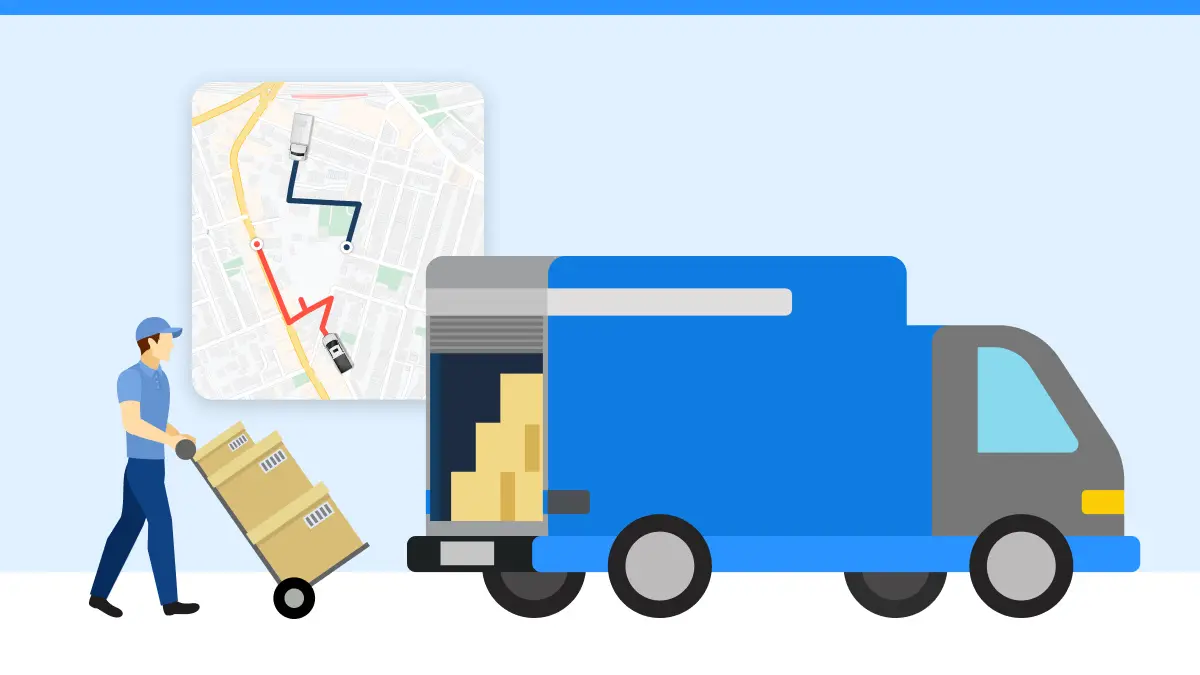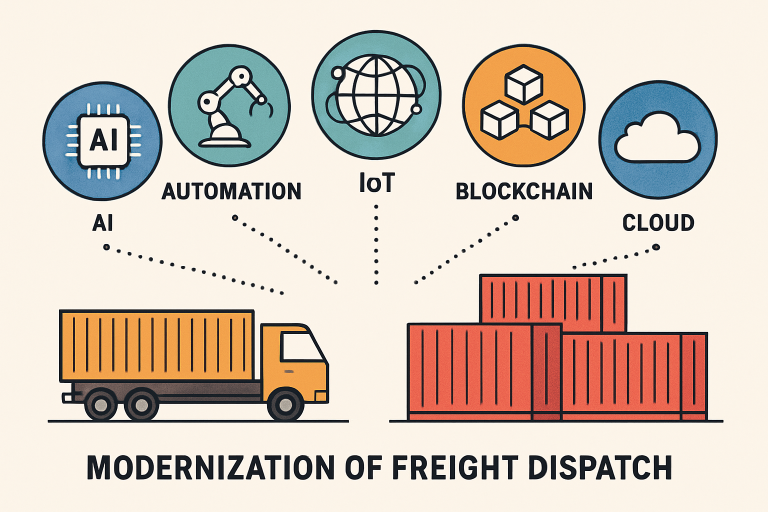Tech
How Technology Is Streamlining Freight Dispatch Processes

Key Takeaways
- Artificial Intelligence (AI) and machine learning are optimizing load matching and route planning.
- Automation reduces manual errors and accelerates dispatch processes.
- Internet of Things (IoT) devices provide real-time tracking and monitoring of shipments.
- Blockchain technology enhances transparency and security in freight transactions.
- Cloud computing enables seamless data access and collaboration across the supply chain.
Introduction
Technology has become the backbone of modern logistics, radically transforming freight dispatch processes across the globe. As competition intensifies and shipping demands grow increasingly complex, freight companies are adopting advanced tools to deliver faster, smarter, and more reliable solutions. By integrating AI software for trucking, organizations can make better, data-driven decisions that save time and resources—key advantages defining industry leaders. These innovative platforms are not only improving operational efficiency but also allowing companies to reimagine legacy systems and keep pace with rapid changes in customer expectations and market needs.
Leveraging machine learning, automation, and real-time connectivity, today’s dispatchers can match loads with available trucks more efficiently, plan optimal routes, and minimize costly delays. Digital dispatch tools now integrate with freight marketplaces and carrier networks, combining real-time market intelligence with past performance data to significantly reduce deadheading and improve asset utilization. Adopting digital solutions is not just a trend; it’s now essential for businesses wanting to remain competitive and resilient in a fast-paced market. Companies can allocate resources precisely and respond swiftly to unplanned disruptions by streamlining processes and eliminating guesswork. Below, we dive into the most significant technological trends reshaping freight management, with practical examples and insights for operators looking to modernize their operations.
Artificial Intelligence Enhancing Load Matching
Artificial intelligence (AI) has become one of the most transformative tools in the freight industry, particularly in matching freight loads with the right carriers. AI-powered platforms analyze historical data, current demand, vehicle capacity, and driver preferences to recommend the most efficient load assignments in real time. These platforms rapidly process thousands of variables—with far greater speed and accuracy than human dispatchers ever could—to optimize every leg of the journey. Solutions like C.H. Robinson’s Digital Dispatch use cutting-edge algorithms that significantly reduce idle truck time and wasted miles, helping fleets stay profitable and reducing industry-wide inefficiencies. By continuously learning from operational inputs and results, AI optimization provides increased flexibility, adapting as real-world conditions change, such as weather disruptions or urgent customer demands. This improves utilization rates and has significant cost savings and environmental benefits. For an in-depth look at these emerging solutions, see this recent report by The Wall Street Journal.
Automation Accelerating Dispatch Operations
Automation integration in freight dispatch drastically streamlines operations once bottlenecked by manual processes. Modern transportation management systems use robotic process automation (RPA) to swiftly complete repetitive tasks like invoice creation, bill auditing, and tracking updates. Automation frees up human resources—dispatchers and logistics coordinators can now devote more energy to building relationships and resolving exceptions requiring critical thinking. Dispatchers can focus on more strategic tasks by reducing error rates and eliminating paperwork while customers enjoy faster service and higher accuracy. The benefits extend from smoother onboarding of carriers to improved cash flow, since automated auditing and billing ensure prompt payment and fewer disputes. This uptick in productivity boosts satisfaction and allows logistics companies to scale their business effortlessly. For more information on how automation is changing logistics, Forbes offers valuable insights.
IoT Devices Enabling Real-Time Monitoring
The deployment of Internet of Things (IoT) devices is reshaping how companies monitor shipments throughout their journey. IoT-enabled sensors and GPS trackers are now commonplace in freight and fleet management, providing continuous streams of data about the location and state of each shipment. Smart trackers and environmental sensors allow dispatchers to continuously oversee freight’s location, condition, and status, sending real-time alerts about temperature fluctuations or delivery delays. This unprecedented visibility helps companies proactively address disruptions and streamline issue resolution, significantly enhancing reliability and transparency for shippers and receivers. Moreover, automated alerts help dispatch teams take instant action—rerouting vehicles, contacting drivers, or notifying customers, all with minimal downtime. Real-time monitoring also strengthens compliance with regulatory standards in temperature-sensitive cargo like pharmaceuticals and food, resulting in less spoilage and improved customer trust. As IoT technology advances, the accuracy, security, and use cases for real-time monitoring will expand exponentially.

Blockchain Enhancing Transparency and Security
Blockchain technology is emerging as a vital innovation in securing freight transactions and increasing transparency across logistics networks. Through decentralized ledgers, all shipment movements and contractual agreements are logged immutably, greatly minimizing opportunities for fraud or error. Additionally, digital identities reduce paperwork and reconcile records faster than manual processes. Smart contracts automatically enforce payment, delivery confirmation, and compliance requirements, reducing the need for intermediaries and accelerating the settlement process. This trusted, digital approach streamlines documentation and establishes a single source of truth in supply chain transactions. This is critical in multi-party environments where accuracy and trust can impact every stakeholder. Companies are now exploring blockchain for cross-border logistics, customs clearance, and high-value or sensitive cargo, making processes much more secure and accountable. Additional details about blockchain’s impact on the freight industry can be found on Cointelegraph.
Cloud Computing Facilitating Seamless Collaboration
Cloud computing eliminates geographic barriers and fosters greater collaboration among logistics partners, drivers, and management teams. Cloud platforms enable swift communication and decision-making- even across multiple time zones- by allowing instant access to transport data, digital documents, and performance analytics from any connected device. This flexibility supports the management of global supply chains, improves service agility, and ensures consistency in customer experience. In addition to day-to-day operations, cloud solutions are crucial during business continuity events, allowing teams to remain connected and productive regardless of location. Companies embracing cloud-based dispatch solutions also gain the ability to scale up or down with ease, remaining resilient amid shifting market demands and business growth objectives. Businesses that migrate their dispatch operations to the cloud also benefit from continuous software updates, data backup, and enterprise-level security, all critical to supporting sustainable growth and compliance.
Conclusion
Modern technologies like AI, automation, IoT, blockchain, and cloud platforms fundamentally reshape the freight dispatch landscape. These advancements drive operational efficiency and enhance security, transparency, and cross-organizational collaboration. Adopting digital tools is no longer optional for logistics companies—it’s a requirement for thriving in a data-driven, interconnected world. Investing in innovative solutions sets the stage for future growth, customer satisfaction, and a more intelligent, resilient supply chain network. As the industry continues to evolve, those who embrace technology will lead the way in delivering higher performance, building trust, and meeting the ever-changing needs of global commerce.
